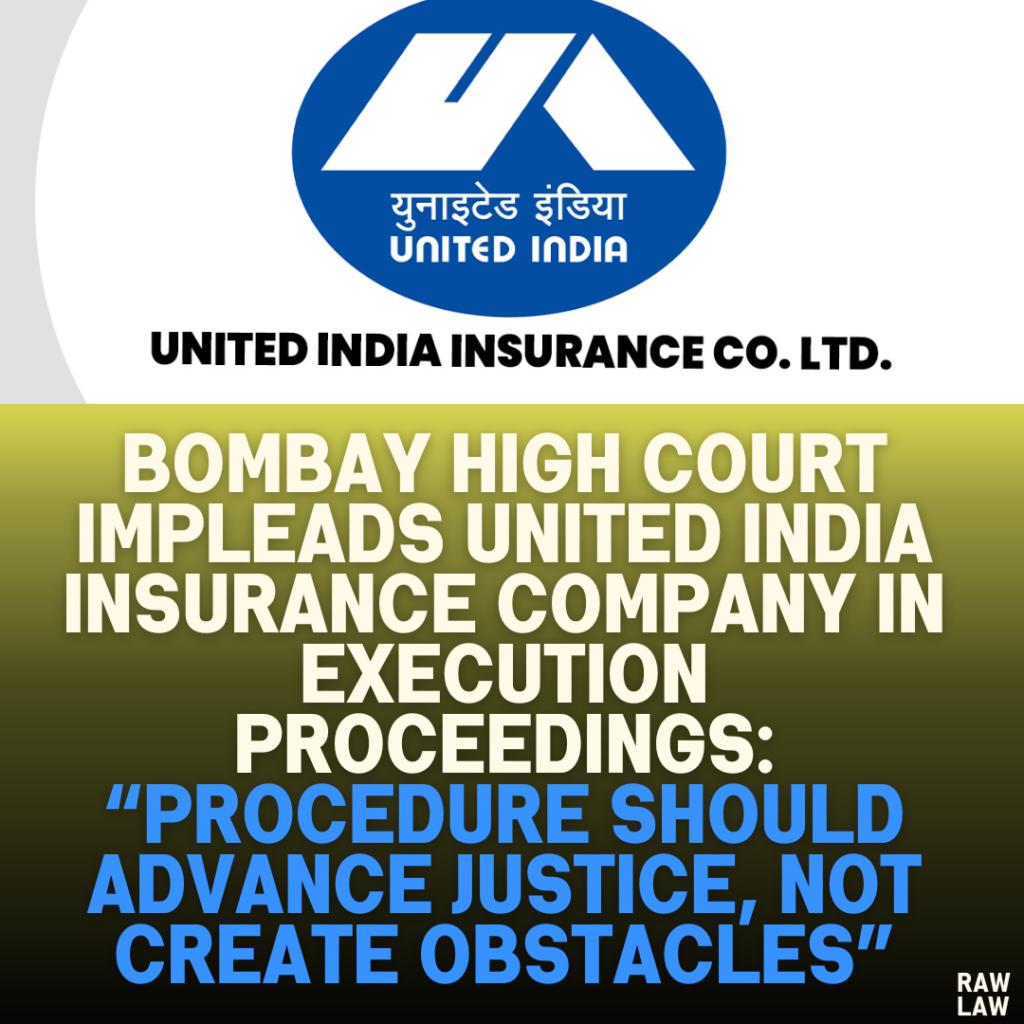Court’s Decision:
The Bombay High Court allowed the impleadment of United India Insurance Company in the execution petition filed by the decree-holder under Section 146 of the Code of Civil Procedure, 1908 (CPC). The court emphasized that procedural law is meant to facilitate justice and should not be interpreted to deny the enforcement of a lawful decree.
Facts of the Case:
- In 1993, the applicant shipped goods valued at USD 499,000 from New Delhi to Budapest under a Marine Insurance Policy issued by United India Insurance Company, covering all risks, including non-delivery.
- The goods were transported to Hamburg, Germany, but never reached the final destination, Budapest, Hungary, leading the buyer to cancel the order and claim damages from the applicant.
- The applicant approached the insurer, submitting necessary documents and survey reports confirming non-delivery. However, the insurer repudiated the claim, asserting non-coverage under policy terms.
- The applicant filed Admiralty Suit No. 23 of 1994 against the shipping company, securing a decree in 2002 for USD 704,000 plus interest. However, the insurer was not made a party to the suit.
- Subsequent complaints against the insurer before the National Consumer Disputes Redressal Commission (NCDRC) and the Supreme Court were dismissed on technical grounds of limitation, without addressing the merits.
- The applicant sought to implead the insurer in execution proceedings to satisfy the decree, citing Section 146 CPC, which allows proceedings against parties claiming under or bound by the same title.
Issues:
- Applicability of Section 146 CPC: Whether the insurer, not being a party to the original suit, can be impleaded in execution proceedings.
- Impact of Earlier Decisions: Whether the dismissal of complaints on limitation grounds bars the current application.
Petitioner’s Arguments:
- Valid Insurance Policy: The policy covered all risks, including non-delivery, confirmed by survey reports. The insurer’s liability remains since no merits-based adjudication occurred.
- Advancing Justice: Procedural law, including Section 146 CPC, must ensure justice by facilitating decree enforcement. Technicalities should not frustrate a lawful decree.
- Binding Liability: The insurer is liable under the same title as the original judgment debtors due to the insured risk’s linkage to the decree.
Respondent’s Arguments:
- Repudiation of Claim: The insurer denied liability under the policy, citing expired transit coverage and contractual terms.
- Not a Party to the Suit: The insurer cannot be impleaded post-decree as it was not a party to the original proceedings.
- Res Judicata: Earlier dismissals by the NCDRC and the Supreme Court on limitation grounds preclude reopening the matter.
- Exclusion of Coverage: The insurer argued that the transit clause terminated coverage before the loss occurred.
Analysis of the Law:
- Section 146 CPC:
- This section allows execution proceedings against persons claiming under or bound by the same title as parties to the decree.
- The court emphasized a liberal interpretation of Section 146 CPC to avoid rendering decrees infructuous.
- Precedents:
- Jatindra Mohan Banerjee v. Kali Charan: Held that procedural law must facilitate justice, allowing parties claiming under the same title to be impleaded in execution proceedings.
- Saila Bala Dassi v. Nirmala Sundari Dassi: Stressed the liberal application of procedural provisions to advance substantive justice.
- Repudiation and Merits:
- The court observed that the insurer’s claim of repudiation was never adjudicated on merits. Earlier dismissals addressed limitation, not substantive issues.
Precedent Analysis:
The court relied on key precedents to support its findings:
- Jatindra Mohan Banerjee: Section 146 CPC enables impleadment of non-parties who share liability under the decree’s cause of action.
- Saila Bala Dassi: Section 146 should not be interpreted restrictively, as procedural law must serve justice, not obstruct it.
Court’s Reasoning:
- Liability Under the Policy:
- The Marine Insurance Policy covered the shipment from Delhi to Budapest. The surveyor’s reports confirmed non-delivery, indicating insurer liability.
- The letter of repudiation lacked merit-based adjudication, leaving the insurer’s liability unresolved.
- Procedural Justice:
- Procedural laws must not deprive a decree-holder of their lawful entitlements.
- Section 146 CPC applies where other provisions are insufficient to address execution issues.
- Impact of Earlier Proceedings:
- The NCDRC and Supreme Court dismissed claims on limitation, without delving into policy repudiation. Hence, the insurer’s liability remains open to challenge in execution proceedings.
- Binding Nature of the Decree:
- The decree clearly recorded non-delivery of goods, affirming the applicant’s entitlement to recovery. Allowing the insurer to escape liability would render the decree meaningless.
Conclusion:
The court allowed the application, directing the impleadment of United India Insurance Company in execution proceedings. It affirmed the applicant’s right to enforce the decree and stated that objections on repudiation could be raised in subsequent execution hearings.
Implications:
This judgment reinforces the judiciary’s role in interpreting procedural laws to ensure justice. It clarifies the scope of Section 146 CPC, ensuring decrees are enforceable against parties sharing liability under the same title. The decision also highlights the need for procedural flexibility to prevent technicalities from undermining substantive rights.




Pingback: Jammu & Kashmir High Court Upholds Preventive Detention Under PSA for Alleged Terrorist Links: "Specific and Proximate Allegations, Procedural Compliance Justify Detention to Safeguard State Security" - Raw Law